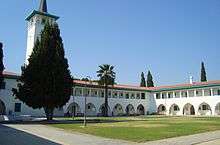Education in Cyprus
Education in Cyprus is overseen by the Ministry of Education and Culture.
The education system is divided into pre-primary education (ages 3–6), primary education (ages 6–12), secondary education (ages 12–18) and higher education (ages 18+).[1] Full-time education is compulsory for all children aged between 5 and 15.[2] State-provided schooling including higher education is paid for by taxes.
There is also a parallel system of accredited independent schooling, and parents may choose to educate their children by any suitable means. Private school and university fees are not usually covered by the state.
Higher education often begins with a four-year bachelor's degree. Postgraduate degrees include master's degrees, either taught or by research, and the doctorate, a research degree that usually takes at least three years. Universities require accreditation in order to issue degrees.
Primary education

In the 2014-2015 academic year there were 334 primary schools with 48,796 students and 4,078 teachers.[3]
Higher education
Higher, or tertiary education is provided by a network of state and private universities and colleges. Private universities were first accredited in 2005 and require a special licence to operate and award degrees. This was set out in the 2005 Private Universities law.[4]
Currently the following universities have a licence by the Ministry of Education and Culture to issue academic degrees:
Public Universities

Private Universities
- European University Cyprus
- Frederick University
- Neapolis University
- University of Central Lancashire Cyprus (UCLan Cyprus)
Private Colleges
- City Unity College Nicosia
- Ledra College Nicosia
- Cyprus Institute of Marketing Nicosia
- Cyprus International Institute of Management
Technical and Vocational Education and Training (TVET)
Technical and vocational training (TVET) addresses multiple demands of an economic, social and environmental nature by helping young people and adults to develop the skills they need for employment, decent work and entrepreneurship, promoting equitable, inclusive and sustainable economic growth, and supporting transitions to green economies and environmental sustainability.[5]
The Human Resource Development Authority of Cyprus (HRDA) is the body in charge of managing training funds in Cyprus. The system relies on contributions paid by all employees, with the exception of the self-employed and government workers. By law the Human Resource Development Levy rate cannot exceed 1% of the emoluments paid to each employee. In practice, the levy rate is 0.5% of payroll, with a monthly cap of €4,533 (Regulation 509/2012).[5]
The HRDA issues grants to employers for approved training as well as allowances to trainees and financial assistance for obtaining training equipment. The HRDA subsidizes 80% of the cost of training, rising to 100% for ‘high-priority multi-company training programmes’.[5]
Sources
![]()
See also
- List of Ministers of Education and Culture of the Republic of Cyprus
- Secondary education in Cyprus
- List of schools in Cyprus
- List of universities and colleges in Cyprus
External links
References
- Ministry of Education and Culture. "Structure of the Education System of Cyprus" (PDF). Retrieved 2013-05-11.
- Cyprus Ministry of Education and Culture. "The Education System of Cyprus". Retrieved 2013-05-11.
- Cyprus Ministry of Education and Culture. "Annual Report 2015" (PDF). Retrieved 2017-10-18.
- Republic of Cyprus, Office of the Law Commissioner. "The Private Universities Law (2005)" (PDF). Archived from the original (PDF) on 2013-01-20. Retrieved 2013-05-11.
- UNESCO (2018). Funding skills development: the private sector contribution. UNESCO. ISBN 978-92-3-100269-4.

